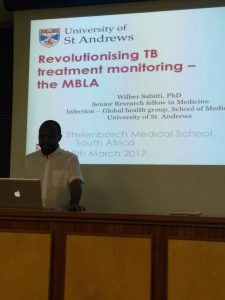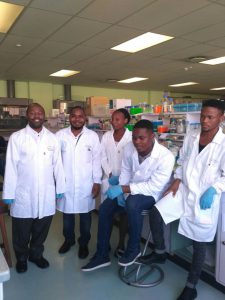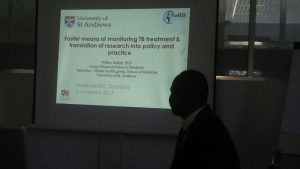Getting innovative diagnostic and treatment tools into policy and practice
While some parts of the world are now deploying 4th generation healthcare technological including diagnostic and treatment tools, some are still struggling to progress to 2nd generation. The question is how do we get everybody to access the best diagnostic tools? There are many answers to this question but the main ones are funding, training and partnership between policy makers and innovators. Dr Wilber Sabiiti has recently given a series of talks and training in different African countries showcasing the advantages of the molecular bacterial load assay (MBLA) and TWENDE work on developing model for rapid uptake of health research innovations into policy and practice.
Developed and optimised at University of St. Andrews, the MBLA is the first assay in the world of bacteriology to offer rapid molecular quantification of bacterial burden. Traditionally, bacterial load quantification has depended on grown on solid agar medium and counting the number of colonies. This approach works well if: the bacterial species rapidly grow on solid medium; 2) the entire species population grows on solid medium; and 3) the medium is effectively selective to inhibit other bacterial species from growth. The reverse is true with Mycobacterium tuberculosis (Mtb), which is a slow grower, proportion of its population doesn’t grow on artificial growth media and often the sample decontamination techniques fall short of removing non-mycobacterial organisms. The MBLA solves these challe nges by offering a contamination-free rapid, sensitive and specific quantification of patient Mtb burden. Like viral load monitoring of antiretroviral treatment in HIV infection, MBLA monitors the response to anti-tuberculosis treatment by measuring the decline in bacterial load of a patient during treatment follow-up. The results are available in as little as 4h from the time reaches the lab. Read more of Dr. Sabiiti’s presentation to the department of Biomedical Sciences Stellenbosch University.
nges by offering a contamination-free rapid, sensitive and specific quantification of patient Mtb burden. Like viral load monitoring of antiretroviral treatment in HIV infection, MBLA monitors the response to anti-tuberculosis treatment by measuring the decline in bacterial load of a patient during treatment follow-up. The results are available in as little as 4h from the time reaches the lab. Read more of Dr. Sabiiti’s presentation to the department of Biomedical Sciences Stellenbosch University.
 The Stellenbosch’s school of Biomedical sciences is leading research on host biomarkers of tuberculosis and working the Infection group at University of St. Andrews’ school of Medicine studies will be conducted to optimise and integrate microbiological and host biomarkers of tuberculosis disease and treatment response. Dr. Sabiiti gave MBLA training to postgraduate students in the department, some whom will be instrumental in driving the research and implementation of MBLA at Stellenbosch University.
The Stellenbosch’s school of Biomedical sciences is leading research on host biomarkers of tuberculosis and working the Infection group at University of St. Andrews’ school of Medicine studies will be conducted to optimise and integrate microbiological and host biomarkers of tuberculosis disease and treatment response. Dr. Sabiiti gave MBLA training to postgraduate students in the department, some whom will be instrumental in driving the research and implementation of MBLA at Stellenbosch University.
Innovation is not complete until the products are accessed by society. TWENDE is working to create channels for rapid uptake of health research innovations into policy and practice in E. Africa. Innovative tools like MBLA need to be integrated into the tuberculosis control policy so that they can be assessed by the people who most need them. Dr. Sabiiti gave talks at NIMR-Mbeya Medical Research Centre and Kilimanjar o Clinical Research Institute aimed at increasing the awareness of TWENDE work to all staff members who aren’t part of the TWENDE research team, full presentation can be accessed on the link.
o Clinical Research Institute aimed at increasing the awareness of TWENDE work to all staff members who aren’t part of the TWENDE research team, full presentation can be accessed on the link.
TWENDE aims at expanding to all East African Community (EAC) member states. To this end, Dr. Sabiiti visited the Medical Research Centre (MRC) team at the Rwanda Biomedical Centre to discuss opportunities for initiating research collaboration with the University of St. Andrews and the rest of the TWENDE partner institutions in the EAC.